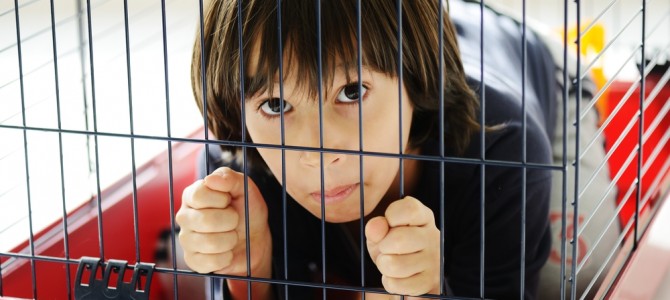
Recently, the better half and I have been wondering how much of a leash we should extend our seven-year-old child. She participates in a few adult-supervised extracurriculars within walking distance of our house, but can she can travel to and from these activities by herself? It’s not that she can’t be trusted to cross the street or otherwise be safe. As for our personal experience as parents, we grew up in towns in Colorado and Oregon where it would have been unthinkable not to let kids our daughter’s age roam on their own.
The problem is where we live now. We live in a Washington, D.C. suburb where, no joke, people on the neighborhood list-serv fret about letting the kids mow the lawn because they might not have polycarbonate protective eyewear or might be exposed to pesticides. If we let our daughter walk a few blocks on her own, we’re not worried she’ll get in trouble—we’re worried some of our neighbors who don’t know a thing about us or our child will call the authorities and get us in trouble.
Our worst suspicions were confirmed in December when two siblings from the Meitiv family, ages 6 and 10, were picked up by the police in another D.C. suburb while walking home alone from a nearby park. The cops were tipped off to this flagrant act of maturity and independence by an anonymous phone call. Child Protective Services found the parents guilty of the wonderfully Orwellian crime of “unsubstantiated” child neglect.
Two weeks ago, the kids were picked up by the cops again for playing alone two-and-a-half blocks from their house. The parents in question are both scientists who adhere to the “free-range” parent movement, which holds that children today are too sheltered for their own good and need to be allowed to wander and make their own decisions. It’s hard to argue there isn’t something to this. Once upon a time, “free-range parenting” was simply known as parenting.
Kids’ Leash Tightens with Time
In 2007, the Daily Mail looked at single family in England’s multigenerational parenting habits and explained “How children lost the right to roam in four generations.” The great-grandfather was allowed at age eight to walk six miles to go fishing. The grandfather was allowed to wander a mile into the woods to play. The mother was allowed to walk a half a mile to the neighborhood swimming pool. And now her son is only allowed to go to the end of the street.
It’s a safe bet there’s many a similar multigenerational tale in America. My grandfather grew up in rural Idaho so far away from school he used to get there with his own sled dog team. I used to bike or walk a couple of miles home from grade school. Now I worry I can’t let my daughter go to the park that’s a block away without some jerk calling Child Protective Services on me.
There’s little doubt this is bad for kids. The Daily Mail cites a doctor who quite plausibly suggests separating kids from their natural environment is bad for their mental health. Michelle Obama’s childhood obesity initiative is a called “Let’s Move,” but it’s near impossible for such initiatives to be successful when kids aren’t allowed to move past the end of the block. According to the Wall Street Journal, “In the U.S., the rate of nearsightedness in people 12 to 54 years old increased by nearly two-thirds between studies nearly three decades apart ending in 2004, to an estimated 41.6%, according to a National Eye Institute study.”
Why is this happening? “One factor that keeps cropping up in research is how much time children spend outdoors. The longer they’re outside, the less likely they are to become nearsighted, according to more than a dozen studies in various countries world-wide.” And there’s no safety rationale for keeping kids cooped up—crime in America has been steadily dropping for years. Alas, our perception of child endangerment is skewed by the fact that we have an unhealthy habit of making every unfortunate thing that befalls a kid a national news story.
When Neighbors Call the Cops Instead of Asking You
The only real roadblock to healthier kids who spend more time playing outside is the meddling of do-gooders who put the “loco” in in loco parentis. Exhibit A is this infuriating article in Slate, “The Bystander Effect: What is it like to be the neighbor of a ‘free-range kid’” written by one of the Meitiv family’s neighbors. Sure, it’s possible that the Meitivs are negligent parents, but the presumption that parents should be assumed capable unless proven otherwise is not undermined by this article, which contains a good deal of, yes, unsubstantiated hearsay. First, the author Jessica Roake attacks the notion the kids were going to the park:
The 911 caller was a guy walking his dog who’d never seen the children before; when the operator asked the caller if he’d spoken to them, he replied, ‘I don’t want to scare them.’ At the time of the call, the kids were about to enter a multilevel parking garage in a sparse commercial block of Silver Spring, next to the Greyhound station and across from a vape, hookah, and smoke shop.
So in other words, the caller thought it better to call the cops than simply take it upon himself to ask the kids if they were okay or needed help. The fact that the kids live in a semi-urban environs with commercial businesses and parking garages is somehow dangerous? And there was *gasp* a headshop nearby. Maybe we could tolerate a few loitering stoners, but the second-hand steam from the vapers could pollute their inchoate lungs! More than 200 million Americans now live in urban environments. If passing through the neighborhood described here is unsafe, almost no kids will ever be allowed outside.
A Very Limited Notion of ‘Tolerance’
Then we get to a defense of the motivations of the people that live in this particular neighborhood:
I don’t know the Meitivs personally. But I live and parent two small children in their community of Silver Spring/Takoma Park—an area known as ‘the Berkeley of the East’—and its reputation for hippy-dippy deference to any and all parenting philosophies is well-earned. (As one dad told me, ‘The helicopter parents live in Bethesda.’) It’s laughable to portray the parents here as a Stasi of hypervigilant snoops. There are no roaming bands of snitches stalking free-range kids around our neighborhoods. In East Silver Spring and Takoma Park, tree-lined (often sidewalkless) streets, colorful bungalows, and tens of parks are a quick walk to a bustling downtown, two metro stations, and thoroughfares both major (the very busy Georgia Avenue) and down-at-heel (the block with the parking garage).
Well, I don’t live in this neighborhood, but I live close enough to it that I know what a self-serving bit of nonsense this is. By American norms, this neighborhood—like nearly all the D.C. suburbs—is very, very liberal and very, very wealthy. “Its reputation for hippy-dippy deference to any and all parenting philosophies” extends to tolerating either kefir or chewables for your child’s daily probiotic, and I assure you it does not encompass sending a kid to school who tells his classmates the global warming threat is overstated, abortion is murder, or maybe we shouldn’t force people to make gay wedding cakes.
As for whether it’s “laughable to portray the parents here as a Stasi of hypervigilant snoops,” I must repeat that these kids were picked up by the cops based on an anonymous phone call and the parents were charged with “unsubstantiated” child neglect for what crime again? Then after all that, one of their neighbors is now writing an article in a national publication about how the parents had it coming, by getting their other neighbors to rat them out. This sounds a lot like the Stasi to me:
I’ve spoken to 12 parents who do know the Meitivs—none of whom have called the authorities about the family—about what it’s like to be the neighbor of a free-range family when you yourself are raising non-free-range kids. Most of these neighbors didn’t want their quotations attributed… The Meitivs are, by all accounts, ‘nice, kind, together’ kids who—like all normal children—sometimes get into trouble and need help when unsupervised, at least in the view of non-free-range parents. Andy Sullivan, an East Silver Spring dad, recalls being at a playground a few years back, the Meitivs playing nearby, when an adult began yelling at the older Meitiv. ‘Suddenly he yells, “Hey! I saw that! You just punched her in the face! Where’s your mom and dad?” He was quite irate. Kid denies hitting his sister, adult insists—“Did not,” “Yes you did”—and finally the adult says, “I’m taking you home. Where do you live?” and marches them off.’ In Sullivan’s view, “Bystanders are forced to step in and enforce discipline because the parents aren’t around.
One neighbor told me about the time the Meitiv kids were escorted ‘through the crowd at the Takoma Folk Festival to look for their parents because they didn’t know where they were.’
Now, I’m not a free ranger—I’d like to be, but thanks to articles like this one I’m afraid of being charged with any number of unsubstantiated crimes. Yet it’s hard to see the above as an indictment of the Meitiv children. Despite our best efforts to be on top of them, my children have hit other kids and gotten lost. Indeed, it’s hard to find a child that hasn’t done these things. On this point, Roake even admits the premise of her own article isn’t rock solid. “None of these stories are damning—they only tell us that the Meitivs are kids who act like kids,” as she puts it. If that’s the case, why is she inviting everyone on the Internet to scrutinize their behavior?
Growing Up Requires Freedom
As someone who serves on a school board at a K-8 school and otherwise spends quite a few hours on the playgrounds with my own kids, a far bigger problem than needing strangers to step in and occasionally help unsupervised kids is parents who reaffirm their kids’ bad behavior when they’re standing by and given ample opportunity to correct it. Many parents are afraid that if they say anything to their progeny that sounds angrier than an NPR host on Quaaludes they’ll irreparably damage Brielle’s already overinflated self-worth, yet it’s usually the same parents who get irrationally angry should a well-intentioned stranger kindly suggest their child stop kicking that poor dog.
But regardless, you know what it’s called when kids make mistakes without adult supervision and have to wrestle with the resulting consequences? Growing up. As free-range parenting gets more popular, I suspect we’ll see more knee-jerk attacks on parents like the Meitivs. I think most of America will welcome the free-range movement with open arms, but there’s little doubt this newfound freedom threatens the supposedly enlightened and tacitly authoritarian political program in very liberal communities such as the D.C. suburbs.
Here, the only thing more frightening than leaving child alone to take care of himself is letting that child grow up to be an adult who learns to think and act independently.









